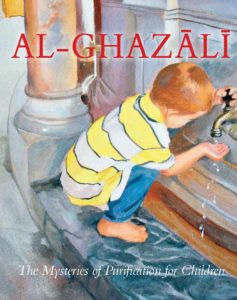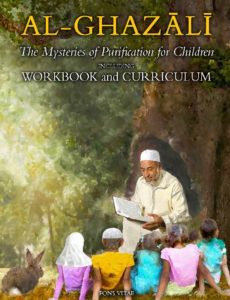Book of Knowledge Mysteries of Purification


Please note that the workbook and curriculum are included in this single volume.
Now joining Book Sets One and Two from al-Ghazali's Revival of the Religious Sciences, the Book of Knowledge and the Book of Belief, is Book Set Three, The Mysteries of Purification. Accompanying the translation for parents and teachers, the volume for children contains seventeen stories introduced by Shaykh Hamza Yusuf, as well as a complete workbook and a curriculum with marvelous supportive activities for schools and home schools. Both parents and children will be inspired by being able to understand the deeper meanings and beauty of the rituals of purification, from the teachings and insights of Imam al-Ghazali.
Click here to sample pages
Chapter Summaries
CHAPTER 1: "PURITY IS HALF OF FAITH"
This chapter helps children understand Ghazali's teaching about this saying of the Prophet (S) with which he begins the book and how it speaks not only of physical cleanliness, but also, and above all, of a heart that is clean of selfishness, greed, and hatred.
chapter 2: the miracle of water
Ritual purification in Islam is accomplished by washing the mouth, nose, face, hands, head, and feet with pure water in a prescribed manner and in the original work, Ghazali devotes many pages to the details of what constitutes the purity of water from the standpoint formal rules (fiqh).The aim of this chapter for children, however, is to give them the chance to think about water itself, how it reaches us, and what its source is.
Rain as a sign of God and divine mercy is mentioned throughout the Quran. It is described as the source of every living creature [24:45] and also called "blessed water" [ma'am mubarakan, 50:9]. Children may have already studied the water cycle in school, but here they are asked to reflect on it as a marvel of God's creation.
This is also a place for them to become more aware of the preciousness of water and the necessity of not wasting it.
The virtues stressed in this section are gratitude, reflectiveness, and care.
chapter 3: the ritual ablution
This chapter focuses mainly on Ghazali's teachings about how each element of the ritual ablution can be a means of remembering God and being present with the heart.
The prayers or expressions of intention that he suggests to accompany the washing the parts of the body that need to be washed – mouth, nose, face and eyes, hands, top of head, ears, and feet – are expressed in language that is comprehensible and accessible to children. For example, "O God, brighten my face on the Day when I meet You and make my eyes clear so they can see Your gifts," and "May I use both these hands to help Your creation."
This is also a place to recall again the Prophet's (S) injunction not to waste water when washing, how the earliest of the faithful used a small vessel for this action, and why Ghazali says that those who waste water "lack common sense."
The virtues stressed here are gratitude, service, and respect for natural resources.
chapter 4: grooming and appearance
The last part of the original book speaks at length about grooming and personal appearance. For children, the focus will be on personal hygiene, which includes brushing the teeth (something recommended by many hadith), and how maintaining a good personal appearance can be done out of respect for others, not in order to show off in their eyes. Imam al-Ghazali teaches the difference between the two in his discussion of why the Prophet (S) once checked his reflection in the surface of a water pot before going out to meet some visitors from a distant land.
The virtues being stressed here are humility, self-respect, and respect for others.
Book of Knowledge Mysteries of Purification
Source: https://ghazalichildren.org/books/the-book-of-purity/